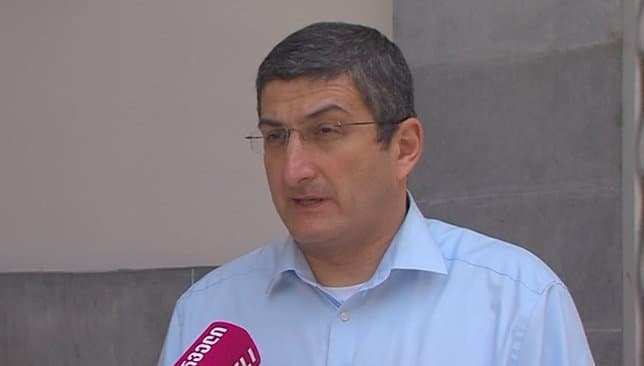Diplomat Gigi Gigiaze: I hope Georgian people won’t have to answer for Gov’t’s mistakes, wrongdoings

Author
Front News Georgia
In recent weeks, the summoning of the British and German ambassadors to Georgia’s Foreign Ministry — followed by ambiguous explanations from the ruling party — has sharply worsened relations with Western partners. In an interview with Front News, diplomat Gigi Gigiaze discusses the possible logic behind these moves and the damage inflicted on Georgia’s European prospects. He describes the Government’s actions as a deliberate attempt to distance the country from its Western path, which, in his view, serves to deprive Georgia of its European perspective and isolate it from the West.
The diplomat also questions the Government’s statements, arguing that offensive rhetoric toward ambassadors automatically damages relations with their countries. He sees the summoning of the envoys as an attempt at blackmail ahead of local elections.
Q. In recent days, the British and German ambassadors were summoned to the Foreign Ministry, where, by all accounts, they faced unpleasant conversations. The Government later claimed that the German Ambassador had come of his own accord with requests concerning grants. How do you assess this situation, and what logic do you see in the Government’s actions?
A. The Government’s actions serve a single purpose: distancing Georgia from the Western world. It is a deliberate attempt to damage the country’s foreign policy course. Ultimately, the aim is to make Georgia lose its European perspective and drift away from the West.
Q. There have been harsh statements about ambassadors before, especially toward the EU and its member states, but not actual summoning to the Ministry. Do you link this decision to any particular situation — for example, the upcoming elections?
A. Summoning ambassadors is a normal diplomatic practice. The question is: for what reason, and with what accusations? In this case, the accusations are that these envoys support extremism in Georgia and violate the 1961 Vienna Convention. They are addressed in dismissive and offensive terms. But the Government knows very well that ambassadors do not act on personal whims — they represent their countries’ positions. Any attempt to insult or belittle them is automatically a reflection of Georgia’s attitude toward those countries. This looks like an attempt at blackmail, tied to the ruling party’s desire for international backing in the local elections — support that, I believe, will not materialise.
Q. Georgia has also changed its ambassadors in Germany and NATO. Do you see this as an attempt to fix relations, perhaps with Germany, by appointing a diplomat with stronger local ties?
A. I will not comment on individuals, but the fact remains: representatives of an illegitimate Government cannot become legitimate simply through diplomatic appointments. Whoever they send, it makes little difference. Traditionally, Georgian ambassadors in the EU focused on advancing integration. But when the Government itself openly rejects ties with the EU and NATO — NATO, in fact, has been off the agenda for 13 years — it is unclear what the ambassadors’ real functions will be.
Q. Foreign Minister Maka Botchorishvili was not invited to the Luxembourg ministerial or to an event hosted by US Senator Marco Rubio in New York. The Government claims this is a “Soviet-style” punishment for not doing what the West wants. How do you interpret this?
A. This is fully consistent with what I have said. The EU and its member states do not recognise the Georgian Dream as a legitimate Government, so they keep their distance. The lack of invitations is a clear message: these partners do not want to engage with them.
Q. Georgian President Mikheil Kavelashvili, speaking at the UN, said the Government is open to cooperation but demands “respect and dignity”. Who was this directed at, and how do you interpret his words?
A. This was essentially a threat: accept our conditions, or relations will deteriorate further. I cannot imagine how they could worsen more than they already have — unless, perhaps, the Government goes as far as declaring some EU ambassadors persona non grata. Sadly, that would not surprise me. Kavelashvili’s tone reflects the ruling party’s de facto position: making demands the West cannot accept, since no democratic partner will legitimise a Government that jails political leaders.
Q. Kavelashvili also claimed he had direct communication with US President Donald Trump, who promised to revisit Georgia’s case. Do you believe this?
A. Frankly, I do not. A party that scares its own people with tales of the “global war party” and the “deep state” has no credibility. If such a meeting had truly happened, there would be photos and videos. Notice how, in this claim, Kavelashvili avoided mentioning the “deep state” — he knows exactly which audience he is trying to deceive. In reality, this is just about misleading Georgians, and perhaps even themselves.
Q. Finally, on the EU’s upcoming decision on visa liberalisation. Many Georgians are worried that visa-free travel might be suspended. Do you see this as a real risk?
A. I sincerely hope that the Georgian people will not have to bear the consequences of what the Georgian Dream is doing now. Visa-free travel is one of our greatest achievements, and it would be tragic to lose it. The Government was given a clear set of conditions and deadlines, which it has failed to meet. Still, I hope that ordinary Georgians will not be punished for the mistakes and wrongdoings of the de facto authorities.
Tags:
Gigi Gigiadze




